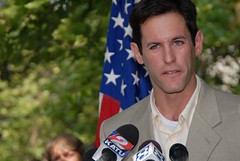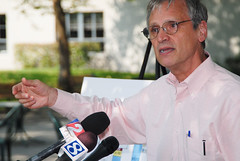Ending speculation since the announcement on Friday, U.S. Congressman Earl Blumenauer was in Portland this morning (sans bowtie) to deliver some “straight talk” about energy policy and unveil a bill that will help cure America’s ailing transportation policies.
Expensive oil and gas prices, he said, “has exposed the vulnerabilities of American families to what President Bush famously said was an addiction to oil.”
Standing next to a chart that showed American households living near public transportation services save over $6,000 per year (over those who don’t), Blumenauer introduced his Transportation and Housing Options for Gas Price Relief Act of 2008 (download summary of bill — PDF).
“This is about choices for people, not trapping them in the policies of the past.”
–Rep. Earl Blumenauer
The bill includes a host of provisions that Blumenauer says will give more choices to Americans and that will, “level the playing field to those who don’t want to be auto-dependent.”
Throughout the press conference, Blumenauer made it clear that his legislation will do something to provide relief now, rather than later. “There’s a lot of political oxygen being spent on things that won’t have an impact until 30-40 years from now… More drilling is not a solution.”
Blumenauer said Portland is the inspiration for some of the proposals in the bill. He cited that Portland is not being as adversely impacted by higher gas prices because “we’ve worked hard for decades to provide choices.” Those choices, he said, have resulted in Portlanders driving 20% less than the national average and local families saving $2,000 a year in transportation costs.
Backing up Blumenauer’s claims that Portland is leading by example, this morning’s event also included short speeches by leaders of various agencies and organizations.
Metro Council president David Bragdon said Portland is proud to be a role model. The BTA’s Scott Bricker spoke in strong support of the bill, specifically the section that would double the funding of the national Safe Routes to Schools program and bring it into High Schools (it is currently only for elementary and middle-school students).
Lloyd District TMA chief Rick Williams cited many of the successes his organization has had in reducing drive-alone trips to the Lloyd District. The exemplary work of Williams and his staff has not gone unnoticed by Blumenauer; the bill includes federal funding for more Transportation Management Associations (TMAs).
Among the more innovative measures Blumenauer has included in the bill are a suite of “location efficient” housing programs. These include special mortgages for people who choose to live in a “transit-friendly location” and federal aid for states to build “affordable, location efficient” housing.
Several new grant programs are also part of the proposed legislation. One of them is titled the “Community Transportation Investment Program” which could be used to upgrade streets “to facilitate bicycle and pedestrian use” among other things.
Another grant program would go toward creating more consumer awareness efforts. Specifically cited as an example is Metro’s “Drive Less, Save More” campaign.
Changes in the tax code are also part of the package.
Blumenauer wants to extend the transportation fringe benefit not just to bike commuters (something he has passed through the House three times but has yet to get through the Senate), but also to those who are self-employed (yay!).
About the bills chances of being passed, Blumenauer says they’re “excellent” and that many of the provisions — like changes in the tax code — can be enacted now. He also pointed out that most of the bills proposals will have no net cost.
For the programs that do need funding, Blumenauer plans to pay for them through tightening the tax code (eliminating tax subsidies to “Big Oil”, the “Hummer loophole,” and so on) and by proceeds gained by pending Cap and Trade legislation.
This legislation, and having his favorite issue (transportation) thrust onto the national consciousness, has clearly energized Blumenauer. Answering reporters questions today, he spoke with conviction and confidence.
It’s clear that major changes to America’s transportation culture are on the horizon. But how we change, and who’s vision wins out in the end are the big questions.
Watch the video below for Blumenauer’s nine-minute introduction of the bill:





